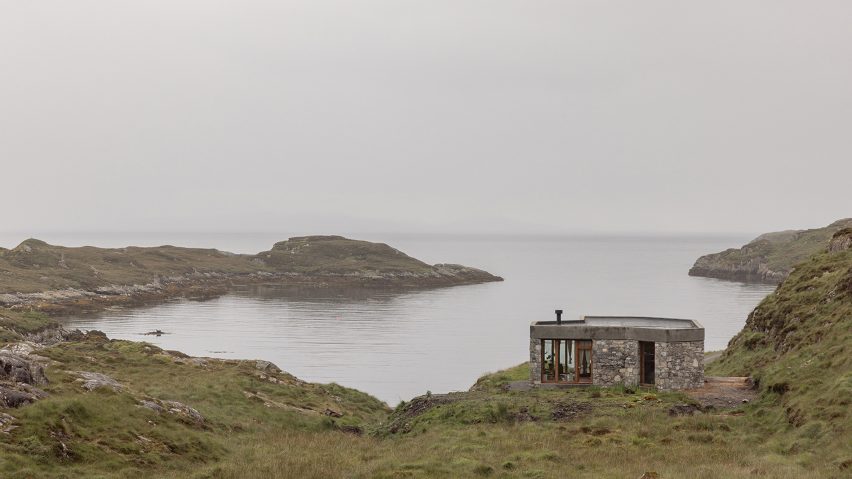To kick off our review of 2024, Dezeen editor Tom Ravenscroft picks the houses that drew readers' attention this year, including a hillside home by Álvaro Siza and three residences that incorporate greenhouses.
Caochan na Creige, Scotland, by Izat Arundell
One of the most popular houses featured on Dezeen this year was a small stone shelter in Scotland's Outer Hebrides by local practice Izat Arundell.
Named Caochan na Creige, which means "little quiet one by the rock", the house has a simple, timber-frame structure and was enclosed in thick walls made from a local stone called Lewisian Gneiss.
According to the studio, the house was designed to "sit respectfully" within the dramatic landscape. Last week, it was named rural house of the year at Dezeen Awards 2024.
Find out more about Caochan na Creige ›
House in Nishizaki, Japan, by Studio Cochi Architects
Among the year's most distinctive houses, House in Nishizaki is wrapped in thick concrete walls that create a buffer from the surrounding city and protect it from being overlooked by neighbouring buildings in the dense neighbourhood.
Designed by architecture practice Studio Cochi Architects, the monolithic house has windowless walls on all sides. It is lit by multiple skylights and a cavernous, full-height courtyard at the rear of the home that pulls daylight deep into the plan.
Find out more about House in Nishizaki ›
Wooden House, the Netherlands, by Moke Architecten
Called Wooden House, this home in Muiden, the Netherlands, is topped with a greenhouse framed by a wooden pergola. Designed by local studio Moke Architecten with landscape practice LA4Sale, the house is located in a new residential area near lake IJmeer.
The rooftop greenhouse, along with a pair of terraces on either side of the home, were designed to give expansive views of the surrounding landscape while ensuring sufficient privacy.
Find out more about Wooden House ›
Peckham House, England, by Surman Weston
Another house that was a hit with the readers and was topped with a greenhouse was this blocky home animated by hit-and-miss brickwork in Peckham, London.
Simply named Peckham House, the self-build project was designed for and built by the directors of Surman Weston, Tom Surman and Percy Weston, and is currently occupied by Weston and his family.
"We wanted the house to be a reflection of our interests and personalities and feel like a characterful family home – full of life and not thematic or stylised," Surman told Dezeen.
Find out more about Peckham House ›
Sprout Ruben & Marjolein, the Netherlands, by Woonpioniers
Also incorporating a greenhouse, although alongside the home rather than on top, is Sprout Ruben & Marjolein in the Netherlands by Woonpioniers.
Created as a prototype for the studio's Sprout concept, the house was constructed from partially prefabricated units and includes numerous bio-based materials, including a wooden frame structure and hemp insulation.
At one side of the house the timber frame extends to enclose a double-height, greenhouse-like space, which acts as a semi-outdoor living area.
Find out more about Sprout Ruben & Marjolein ›
Colien House, Spain, by Álvaro Siza
Designed by Portuguese architect Siza, Colien House was embedded into a hillside overlooking a beach in Barcelona.
Made from orange-tinted exposed concrete, the three-storey concrete home steps down the hill with an outdoor terrace that has wide views across the sea.
"The central purpose was to answer the programme proposal made by the client by including a careful embodiment of the landscape, complying with the specific local rules and the relation of each of the four floors' elevation with the natural topography," Siza told Dezeen.
Find out more about Colien House ›
Casa Detif, Chiloé, Chile, by Guillermo Acuña Arquitectos Asociados
Another distinctive coastal home that captured readers' attention was this cantilevered house wrapped in a red timber lattice and situated on a forested, cliffside site in Chile.
Named Casa Detif, the home was informed by a spinning thaumatrope toy, which has a bird on one side of a rotating panel and a cage on the other. According to the studio, the layears created by the forest, the red lattice, a walkway around the house, and then the glazing were designed to create "increasing levels of intimacy".
Find out more about Casa Detif ›
Casa 1627, Spain, by H Arquitectes
Set within the ruins of a farmhouse near the medieval town of Pals in Spain, this home was designed by local studio H Arquitectes. The studio restored the existing walls and added pale stone and concrete elements that echoed the scale of the historic fabric.
"The two stone facades that have remained almost intact, to the north and to the east, are consolidated and rehabilitated, respecting their values and new openings are added," said H Arquitectes.
Find out more about Casa 1627 ›
Fire Island Pines, USA, by BoND
Architecture studio BoND renovated this mid-century modern home on Fire Island near New York to bring "back the simplicity" of the house, which was originally purchased from the American retailer Sear's catalogue.
"Our aim was to de-complicate the interior and bring back the simplicity of the original design, while also blurring the boundaries of the rigid modernist floor plan," said the studio.
Find out more about Fire Island Pines ›
Northcote House, Melbourne, Australia, by LLDS Architects
Built on the narrow site of a former car park, which measured 4.6 metres by 22 metres, this linear home is defined by its curved timber roof.
According to LLDS Architects, the project was designed to showcase how narrow urban plots can be developed into compact houses. It too was recognised at Dezeen Awards 2024, winning urban house of the year.
Find out more about Northcote House ›

